We’ll Call You
A couple of months ago I wrote a tough piece about my disappointment with Steven Soderbergh’s output over the last three or four years, and then Soderbergh let me have it at a Sundance party a few weeks later and I heard what he was saying (or feeling), so here’s something olive-branchy:
Unscripted, a half-hour HBO series that Soderbergh and his Section Eight partner George Clooney have exec produced (with Clooney directing now and then), is the best original thing I’ve seen on the tube in a long, long time.
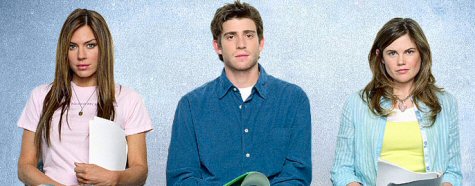
It’s mainly about three hard-luck actors more or less playing themselves (Krista Allen, Bryan Greenberg, Jennifer Hall) and dealing with the usual thespian woes — auditions, rejections, agent relations, more auditions, lost parts, occasional couplings, etc.
It feels honest, economical, “real”…and I say that knowing that it’s pretty easy to fake a reality atmosphere in any guise. It’s a concise and beautifully edited thing, there isn’t a false note in any aspect of it, and it’s pretty close to dazzling. K Street, the last Section Eight HBO show, was good but this is better.
< ?php include ('/home/hollyw9/public_html/wired'); ?>
I’ve only seen two of the ten episodes and there are only two more episodes to go…but there will be re-runs and a DVD box set later this year. It plays Sundays at 10 pm.
The great Frank Langella co-stars as a 60ish acting teacher, Goddard Fulton, who also gets kicked around and his face smudged. Nobody has it easy in this show. Things are tough all over.
“The truth of the matter is [that] less than five percent of [union actors] make all the money,” Clooney says on the show’s website. “And that’s just the people in the union. There are so many actors that get up every morning and — forget getting a job — they try to get an agent. Or an audition. We’re trying to show what it is that we do. It’s completely unlike the way it’s usually portrayed.”
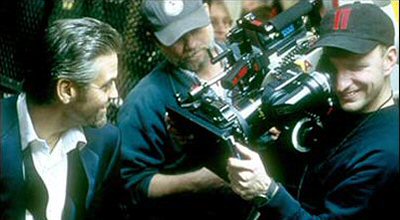
It’s been claimed that the show doesn’t use prepared dialogue, that it’s all improv and things like rehearsals, retakes or reshoots don’t figure. (I can believe this.) The series has allegedly been shot in “real offices” and during “real film productions,” with the actors sometimes crossing paths with “real-life Hollywood stars and directors”…as far as that goes, fine.
Clooney, Soderbergh and Grant Seslov are the executive producers of Unscripted. It’s produced by Michael Hissrich and Joanne Toll; the episodes have been directed by Clooney and co-exec producer Grant Heslov.
Episode #9 of Unscripted preems on Sunday, 2.20, with another airing the following night (i.e., Monday) at 9:30 pm on HBO2 and then Wednesday, 2.23 at 10 pm on regular HBO.
Looksee
Wandering movie journos who haven’t seen Paul Reiser and Raymond DeFelitta’s The Thing About My Folks have a shot at seeing it on Monday, 2.21, at my UCLA Sneak Preview class, which begins at 7pm at the Wadsworth.
RSVP to Sarah Rose Bergman at 310.572.1500 or write jeffdowdassist@aol.com.
If this invite isn’t ringing any bells, I wrote about this amiable little film in my February 8th column . Some distribs think it plays too old, but I’m convinced it’ll play big with the crowd that went to see My Big Fat Greek Wedding. I could be wrong, but I’m not.
Heart on Sleeve
All you have to do is click on this to see where Born Into Brothels is coming from.
It has a video-and-music reel showing Calcutta kids experiencing the joy of taking photos. Acquainting impoverished kids with photography and trying to save them from a squalid life of prostitution (or worse) is what the film’s co-director, Zana Briski, is up to in this unusual documentary. In short, activism rather than the usual impartial neutrality.
In the manner of a wildlife documentarian running out into an African plain to save a zebra from a pursuing lion, Briski (and her filmmaking partner Ross Kaufman — both pictured below) strive to save as many kids as they can from the certain spiritual death that comes to anyone who lives among squalor and prostitutes.
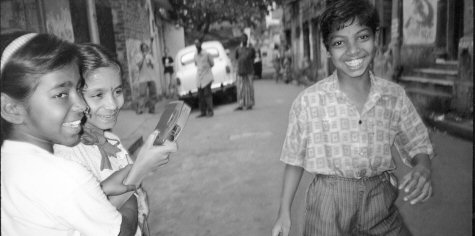
This Oscar-nominated film may have begun as an exploration of children growing up in Calcutta’s whore-house district, but it became a story about trying to get the Indian government and other potential benefactors to sponsor these kids in their education as photographers.
Briski faces tough challenges, not just from the government or the kids’ parents but, believe it or not, from Catholic nuns. In this light, Brothels is an expose of the complacency that keeps unlucky or disadvantaged people where they are, and blocks anything or anyone who might give them hope.
“I just respond to what’s around me, but I wanted to make a good film,” Briski told me a couple of weeks ago. “I didn’t want to be in the film but I became a catalyst.”
The need for education and opportunity among Calcutta’s poor “is enormous…the level of suffering is staggering,” she said. “And we were confronted with it every day. It’s overwhelming for anyone who tries to work in that place. Most of the women are using some form of birth control…and there’s a lot of ignorance. Women don’t know about their bodies.”
Born Into Brothels won the ’04 Sundance Film Festival Audience Award, and is favored (I think) to win the Best Documentary Feature Oscar.
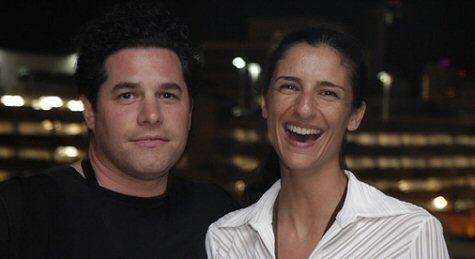
And yet Briski promised the people who helped her make the film (including the ones she interviewed) that she wouldn’t allow it to be shown in India, and she’s managed to prevent that so far. The mothers of the children portrayed in the film don’t want to be “stigmatized,” she says. Not allowing the film to be shown in India or even neighboring Pakistan is “my personal commitment,” says Briski.
When you make a promise you’d better keep it, but Brothels is full of hope and compassion and generosity, and pledging to keep this energy from being absorbed in India seems strange.
Two years ago Briski formed Kids With Cameras, a group that tries to continue the charitable efforts depicted in the film.
Go Ahead…Laugh
Even now, 31 years and five months after its theatrical debut, nobody seems to want to respect or even appreciate The Laughing Policeman. A lot of the reviews of the Fox Home Video DVD that came out two or three weeks ago have either been dismissive or ho-hummy. They should take another look.
I love this film for its gritty milieu and dinghy, matter-of-fact grimness. For me, its sullen attitude is a heavy turn-on. It’s not a great work, but I love that it doesn’t try very hard to “entertain.” It’s a film that says to its audience, “You don’t find what we’re showing you attractive or transporting? Gee, that’s too bad.”
The DVD doesn’t have any extras or voiceovers, but anyone with a taste for hardboiled noir should grab it.
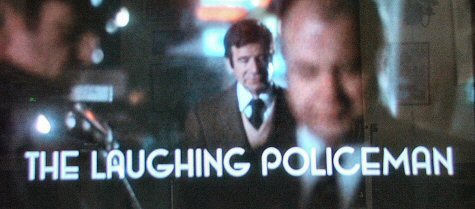
You wouldn’t want to call this a “hard-charging” cop flick — “laid back” would be more like it. And yet by today’s formulaic, semi-anemic standards it’s a genuine pleasure to watch a San Francisco policier that delights in atmosphere to this degree.
It’s not just the cops who seem cynical, miserable, bitter or numb — the innocent bystanders seem this way also. You can almost smell the self-loathing despair, the perspiration, the cigarette smoke and the acidic coffee.
Directed by Stuart Rosenberg and based on a Swedish crime novel, The Laughing Policeman is about an investigation into a mass murder on a San Francisco city bus. Ten or twelve people have been mowed down by some lunatic with a “grease gun,” and the cops don’t have a clue.
A squad of detectives is assigned to the case and Rosenberg acquaints us with some of them (Lou Gossett has the juiciest second-banana role), but the ones we mainly hang with are played by Walter Matthau and Bruce Dern.
Matthau (who was about 53 when it was made) turns in his usual rumpled and grumpy routine, but when Policeman hit screens in September `73 it was seen as a major change of pace. Matthau had been a big comedy guy throughout most of the `60s and early `70s (Plaza Suite, Hello Dolly, et. al.). As a cop lacking in basic people skills, Dern does his usual insinuating obnoxious thing.
One of the big plot points is that Matthau’s partner, a guy named Evans, is among the bus victims. Matthau talks to Evans’ girlfriend (Cathy Lee Crosby), and learns that he was spending his “off” time looking into the murder of a prostitute. He also finds out that Crosby posed for erotic photos, which half-offends him and half turns him on.
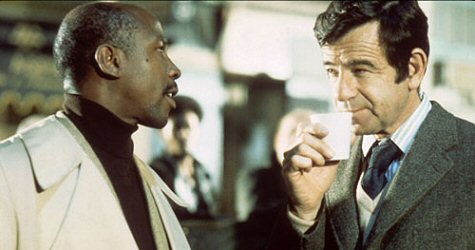
This dirty-pictures element has zip to do with finding the killer, but it adds to the general down-at-the-heels sleaziness. It also tells us that Matthau has a thing for Crosby.
A strain of homophobia pops through when Matthau and Dern start to train their sights on a wealthy gay guy as a possible suspect (the term “fruiter” is heard), but this was made only three years after Stonewall so I guess we can cut the filmmakers some slack.
I just love the way Rosenberg and his crew take their time in solving the murder. The movie seems to say, “We’ll get to it, we’ll get to it…in the meantime have a donut and relax and try paying attention to the other stuff.”
Down, Down, Down
“Anyone who doesn’t immediately nominate John Frankenheimer’s Seconds as the most depressing movie ever made — by some distance — is clearly someone who has never seen the film.
“By comparison, Million Dollar Baby is Singin’ in the Rain, Monster is Gigi and Midnight Cowboy is Seven Brides for Seven Brothers. Unlike those films, nobody in Seconds achieves anything resembling a fulfilling relationship, even momentarily. The entire story is dedicated to the proposition that hope is for fools, and that the most we can wish for is an empty illusion.
“Top it all off with James Wong Howe’s askew cinematography, Jerry Goldsmith’s unsettling score, and the heartbreaking sight of Rock Hudson finally giving a brilliant dramatic performance in a film nobody saw — and you have a film that
lingers in the back of your mind for years, like a bad, bad dream you really wish you never had.” — Jack Lechner, Radical Media.
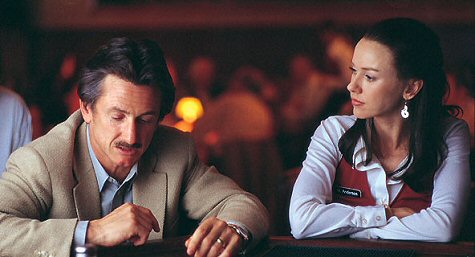
“When I read your downer movie article, the very first things that came to mind were two movies my high school film teacher Jay Kaplan showed back to back in the mid-70’s: The Heart Is A Lonely Hunter and Bang The Drum Slowly.
“Kaplan must have been some kind of masochist to inflict this on a bunch of 17 year-olds, but then again, not many happy endings in that classic era of 70’s films. For a bunch of geeky high school kids, these movies were like a one-two punch of depression. Imagine a bunch of high school seniors just sniffing away in the silence of the dark classroom.
“In the former movie, nobody saw the suicide scene coming, so when you heard Alan Arkin’s gun shots off-screen, the class was totally mortified instantaneously. Then that dissolve to his tombstone… that was killer. The class was a total wreck.
“At least with Bang The Drum Slowly, you found out the deal about halfway (‘My son is dyin’!’), but it was still a head-shaking bummer when good ol’ boy catcher Robert DeNiro did his Brian’s Song exit. My film teacher referred to the hospital parts as the infamous `shit deal scene.'” — Drew Kerr
“David Cronenberg’s Dead Ringers is an exquisitely sad film. Darren Aronofsky’s Requiem for a Dream made me feel like I’d been clocked between the eyes with a 2×4. Mike Nichols’ film Who’s Afraid of Virginia Woolf? still really stings, too. They’re therapeutic, though. True bummers are things like the new Star Wars films and Troy and Bad Boys II — black holes into which enormous amounts of money, talent and creativity disappear.” — Jason Comerford.
“Hurts…hurts so bad! Here are my All-time Downers: Pearl Harbor, Dying Young, St. Elmo’s Fire, Monsoon Wedding, All the Real Girls (I don’t care if you crib from the French or Terrence Malick….learn how to tell a tale), Beaches, Steel Magnolias, Man On Fire, The Perfect Storm.” — George Bolanis
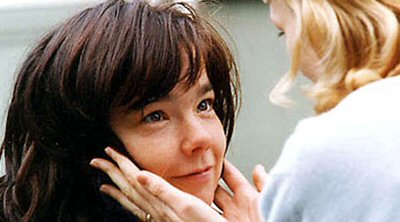
“Most recently, I’ve heard people describe Million Dollar Baby as depressing, to which I say `huh?’ Sad, yes, but depressing? I could watch it over and over.
“For me, a good example of a really depressing movie is House of Sand and Fog. Depressing because, in my opinion, so many relatively intelligent people (like yourself) bought into this pretentious piece of excrement. It was so bad, and so well-liked by critics, that I had to call my entire way of judging films into question.
“Walking out of the theater, I asked my friend (a dim-witted soul but with an oddly good movie bullshit detector), `Was it just me, or was that a piece of shit?’ And he said `Yeah, it was.'” Mark Van Hook, Boston, Mass.
“A triple bill that would have you going for the Prozac: (1) Ironweed — just beats you down…unrelenting on every level. (2) Interiors — not even good drugs help with this one. (3) Kanal — a very difficult and fatalistic vision that grinds a viewer’s sensibilities to a pulp.” — Benjamin Moore
“The Pledge. God almighty, that movie was depressing! Great cast, but oppressive and slow storyline with a downer of an ending.” — Craig Finnerty.
“Here’s your winner, hands down: Gaspar Noe’s Irreversible. Although it aspires to a fleeting moment of hope at the end (beginning), it’s about as dark and bleak a view of humanity as you’ll ever see on celluloid, with nothing remotely redemptive about it.” — Eponymous.
“Recent all-time depress-o-ganza: The Assassination of Richard Nixon. I personally adored the film, and was shocked at the critical indifference it received — it’s the most profound and acute trapped-in-the-mind-of-a-madman head trip since Taxi Driver.
“But when the relentlessness finally abated and the lights went up, I turned to my buddy — who is of the unshakable belief that there are no depressing films, only bad ones — and croaked, `That was pretty goddamn depressing.’ You know what? He agreed — he was shaken. And we talked about the thing for the next couple of hours; neither of us could get it off our minds. If that’s what a genuinely depressing film can do, then I’d argue it’s worth the tough two-hour sit.” — Tim Merrill.
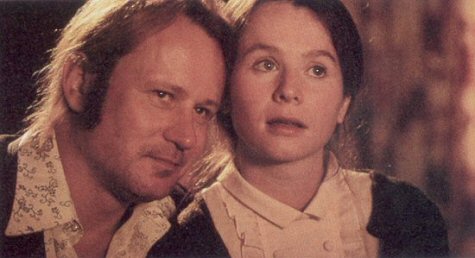
“I’m picky enough to avoid most of the stinkers, but I would have to nominate Purple Rain and Moment by Moment as the two most depressing films I’ve ever seen — not because of their subject matter, but because they were so boring and a waste of my time here on earth.” — Heidi Bortner.
“You clued me into one in a much earlier column — Breaking the Waves. Before Lars von Trier became a total sadist. A movie that was sold as uplifting but was not, in any sense of the word, is Muriel’s Wedding. Though I do admire the hell out of Toni Collette. I saw Blow Up when I was 20, and at that age I thought it was completely depressing. And confusing. Natural Born Killers did not edify me in any way.” — Doug Helmreich
“House of Sand and Fog…bummer! The movie throughout was taxing in its morbidness and depression … but the ending with the (spoiler) son getting killed …now, that’s what I call bleak! For the life of me, I can’t see how anyone can own this film on dvd except for the people who either acted in it or worked behind the scenes (so that they can show their friends … ‘Hey, look, that’s me in the end credits!).” — Ron Koffler
“Dancer in the Dark was, for me, the most depressing movie of all time! A punch in the stomach from beginning to end. I have terrible flashbacks even now while listening to muzak for `My Favorite Things’ at the local supermarket.” — Amy Shemaitis.
“No matter how good it might have been on its merits, Monster was so goddamn depressing that I’d never watch it again. Sure, Charlize Theron is brilliant, but I can’t handle that much despair! I felt the same way about Mystic River, House of Sand and Fog and Leaving Las Vegas. It’s not like I’m some low-brow Neanderthal, either. There’s a good depressing like Million Dollar Baby. The problem is that some films are just so bleak that they don’t make for good re-visiting.
“As for so-bad-it’s-depressing, what about Life or Something Like It? That film was a real kick in the balls. I went to the bathroom three times in 90 minutes just so I could have some relief. Unfortunately, I couldn’t walk out because my wife wanted to stay. — Andrew Hager, Cockeysville, MD.
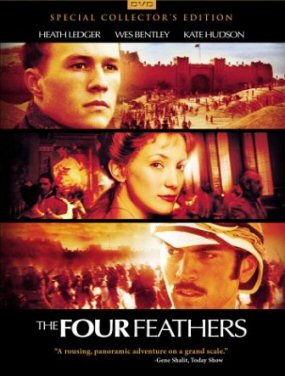
“My favorite bummers: Five Easy Pieces, The Last Detail, Last Tango in Paris, Boys Don’t Cry, Kids, Million Dollar Baby, Elephant, Raging Bull, Grey Gardens.
“Most of these are obvious choices, but they were the first ones that popped into my head. All of them, for me, have a profound undercurrent of sadness/pain running through. They have moments of naked truth that are electrifying art, almost too stark to embrace: Brando cursing at his dead wife’s corpse, the final shot of Million Dollar Baby, the two sailors walking out of the military prison into the harsh cold morning.” — Mark Smith, PhD
I’ve tried my best to just stay away from ‘depressing’ movies. There are plenty of `sad’ movies I love (Mystic River, On the Beach, The Mission, Fail-Safe come to mind). As for those who think all sad movies are depressing…well, what are you going to do? One friend of mine pretty much hates anything that has a sad ending. (One of his favorite movies is Zorro the Gay Blade, if that gives you any idea). People with tastes like that will always be around and they’re not leaving anytime soon. So why complain?
“I’ve always been interested in watching the Oscars, even though some of their Best Picture choices have been, well, wrong. But that’s all I’m interested in; I couldn’t care less about the other awards. Golden Globes, People’s Choice, MTV, CNN, Newark Critics Circle, whatever, they’re all the same. The Oscars are the big show. Who wants a People’s Choice Award or a Golden Globe?– Aaron Mastriani, El Paso, Texas.
“The recent remake of The Four Feathers is a downer. An expensive adventure movie filled with people who can’t act and all look as if they can’t wait to get back to the hotel pool in Morocco. Kate Hudson’s clearly been watching her mother’s old Laugh-In tapes for the vapid aura, and Heath Ledger’s perfected his pout. But together they have so little idea of how to create romantic tension over issues of moral commitment, and were plainly so badly directed in search of such displays, that the movie just lies there and melts. ” — Richard Szathmary
Nicole vs. Dissers
“Regarding Little Miss Brown-Shirt Nicole: I’ll bet you money that she never even saw the movies she listed as “left-wing” (Frida, Motorcycle Diaries, etc.). Please relate to Nicole that the next time she has left-wing propaganda shoved down her throat, to please do us all a favor and choke to death on it.” — Heidi Bortner.
Nicole to Heidi: “You can rest assured at night that I have seen both Frida and The Motorcycle Diaries . I have also seen Reds, The Cradle Will Rock, Guilty by Suspicion, et. al. What I have yet to see is a serious exploration of the true horror and damage that communism has caused around the world over the past 100 years.
“Most rational people know that Che was not a nice man but when I find my future brother-in-law (a 25 year-old actor…ughhh) to be seeing The Motorcycle Diaries and then claiming that communism has got a bum rap and I’m just brainwashed by the hard right-wing establishment into thinking it’s wrong, I wonder if our institutions of higher learning and our entertainment industry may be sending a skewed message.
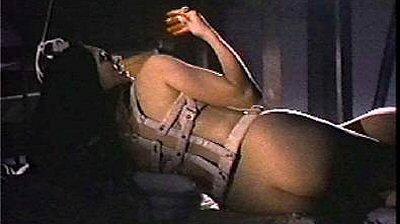
“As for your comment that I should choke to death on the left-wing propaganda the next time…well, the tolerance and love you show in that comment makes me realize that my experiences at film school were most likely shared by many more people than myself. What school did you attend by the way?”
“I just want to say that I echo the sentiments by Nicole. Lefties can be some of the most close-minded, uninformed people I’ve come across. It’s definitely on both sides. I totally agree with her assessment of the kind of films we’ve been force-fed over the years. As a filmmaker myself, I hope to change that, at least in a small way.
“The reasons people don’t care about the film industry as much anymore is because there is such an absence of truth. Even when they do try to say something, they wind up saying things that they want to be true, not things that are actually true. But what can you say? It’s a microcosm of the world we live in. The blind leading the blind. Truth will always resonate with people. Until you see more of that on screen, people will continue not to care. ” — Dan Lowman
Nicole to Dan: Seems like you and I had similar film school experiences. I mentioned before that I had a discussion with an older very leftie reporter friend. I find older leftists much more tolerant because they have lived a life and made choices. Younger student activist types not so much. They don’t know why they believe what they believe, only what to believe and feel vindicated because they see their world view so prominently displayed so much through pop culture and the film industry.
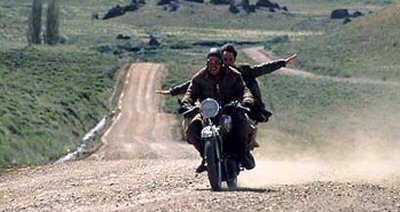
“I believe every story has a right to be told but there seems to be a lack of a search for truth in modern day filmmakers. They are more interested in following ideology than showing both sides. I don’t need any more films showing how repressed the 50’s were. Sure films were unrealistic then to some degree in their portrayal of sexuality but are today’s films any different?
“I’ve seen black gangs, white gangs, Asian gangs and Latino gangs in real life but I’ve never seen a multi-racial gang like presented in most Hollywood films. Modern Hollywood film gangs look like a Baskin Robbins store. Is this any different than the Lucille Ball/Desi Arnaz days of each sleeping in different beds? I don’t think so. Different cultures have diferent taboos. Our artistic taboos are just now on the left instead of the right. No religion, no race, no sex inside of marriage unless it is with leather or boredom. This is no more a reflection of our world than that depicted in Pleasantville.
Stuntmen
“I agree about cookie-cutter car chases and fights. I’m a film director — Bang the Drum Slowly, Weeds, Prancer, Let’s Scare Jessica to Death — and have always had great difficulty getting stunt coordinators to do something fresh. In fact I’ve found it almost impossible. I’ve come to feel I’d be better off without them, just stage the stuff as best I could with the actors. But you can’t get proper insurance without them.
“On the other hand, in terms of awards, I think you’re wrong about stunts never adding anything thematic. Think of the fights in The Sopranos, for example, or Olivier’s codger struggle up and down basement stairs with Peck in The Boys From Brazil, or the two brothers on the beach in Big Night. They’re all off the money and awkward. Hard to get stunt coordinators to do that. — John Hancock.
“How could a nod to stuntmen devalue an award show that is already nothing more than a popularity contest? If these awards were still about the value of a performance then Paul Giamatti would have been nominated for lead actor.” — Rob Jeffers .
Heat Letdown
Regarding your deserved rant against the extra ‘scenes’ on the new WHV double-disc Heat, perhaps DVD producers should all go back to Film 101 and remember to differentiate between ‘scenes,’ ‘sequences’ and ‘shots.’
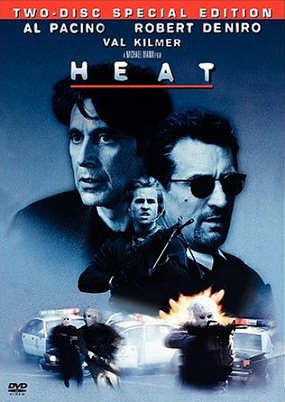
“I too am tired of being promised ‘extras’ only to find the ‘extras’ are just a foot or two of film someone found on the editing room floor.” — Susan Burchfield, Research Director, KTVI FOX 2, St. Louis, MO.
